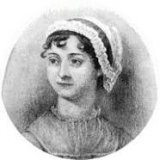A Fable
Jane Taylor 1783 (London) – 1824
ONE day a sage knocked at a chemist's door,
Bringing a curious compound to explore.--
'Behold ! said he, as from his vest he drew it,
'This little treasure in a golden cruet :
A life, a long one, for my locks are grey,
In ceaseless toil has slowly passed away,
To gain that treasure, now my search must stop,
And see, I have but saved this little drop !
To know the worth and nature of the prize,
I bring it here for you to analyze.
The best philosopher could never quite
Its origin and essence bring to light ;
But you, they say, by some mysterious arts,
Reduce all substances to simple parts :
--Your nomenclature differs, sir, from his,
We call it happiness, --and here it is.'
And now the learned chemist strove to guess
With what this curious stuff would coalesce :
First sprinkled on a layer of golden dust,
But this recoiled, and seemed to gender rust ;
Now sundry essences in turn he tries,
Distilled from all that golden dust supplies--
--Castles and villas, titles, vassals, land,
Coaches, and curricles, and fours-in-hand,
Silks, jewels, equipages, parties, plays,
Madeira, venison, turtle-soup, and praise ;--
But strove in vain a union to produce
With one of these, and that small drop of juice ;
As though impatient of the vain essay,
It did but effervesce and fume away.
With more success the chemist next imparts
Extracts from the belles lettres and the arts.
No sooner do they reach it, than he sees
It has some small affinity with these ;
But yet, his nicest skill could not prevent
A large residuum of discontent.
Two curious phials next he brings to view,
The first bright green, the next of roseate hue ;
And first unstopped them with the greatest care,
For when exposed to atmospheric air
They frequently evaporate, and vain
All efforts then to bottle them again.
Essence of friendship from the former flows ;
And though the drop it did not decompose,
The chemist said, it rather seemed to fix,
Or float upon the surface, than to mix.
Long from the next a trembling drop suspends,
--That roseate phial--and at last descends ;
'Ah,' cried the chemist, with reviving glee,
'A perfect coalition here I see !
Distilled from love this gentle fluid came ;'--
And then he told the sage its Latin name ;
Then looked again, to watch the process on,
But found, alas ! the sage's prize was gone !
The sudden contact caused a heat extreme
It could not brook, so passed away in steam.
Alone the essence pale and watery lay ;--
The sage demands his treasure with dismay ;
They search the cruet, and behold it hid,
At last, in pearly drops upon the lid.
Though foiled, the patient chemist will not stop,
But aiming still to decompose the drop,
A potent acid cautiously applies,
And straight it separates in wondrous wise.
For first, appears at bottom of the phial
A large precipitate of self-denial ;
Of patience, next, a copious layer is laid ;
Of conscience, twenty scruples nicely weighed ;
Humility and charity, they find,
With half a dram of self-esteem combined ;
Labour, attached to energy of soul,
And moderation to correct the whole ;
Feeling and taste in airy gas unite,
And knowledge rises in a flame of light.
Font size:
Submitted on May 13, 2011
Modified on April 05, 2023
- 2:44 min read
- 158 Views
Quick analysis:
| Scheme | AABBCCDDEEFFGGHH IIJJEEKKLLMMCCGGNNOO PPQQXXRRSS TTUUVVXXWWCCXXDDEEUXYYZZ1 1 FF |
|---|---|
| Closest metre | Iambic pentameter |
| Characters | 3,063 |
| Words | 547 |
| Stanzas | 4 |
| Stanza Lengths | 16, 20, 10, 28 |
Translation
Find a translation for this poem in other languages:
Select another language:
- - Select -
- 简体中文 (Chinese - Simplified)
- 繁體中文 (Chinese - Traditional)
- Español (Spanish)
- Esperanto (Esperanto)
- 日本語 (Japanese)
- Português (Portuguese)
- Deutsch (German)
- العربية (Arabic)
- Français (French)
- Русский (Russian)
- ಕನ್ನಡ (Kannada)
- 한국어 (Korean)
- עברית (Hebrew)
- Gaeilge (Irish)
- Українська (Ukrainian)
- اردو (Urdu)
- Magyar (Hungarian)
- मानक हिन्दी (Hindi)
- Indonesia (Indonesian)
- Italiano (Italian)
- தமிழ் (Tamil)
- Türkçe (Turkish)
- తెలుగు (Telugu)
- ภาษาไทย (Thai)
- Tiếng Việt (Vietnamese)
- Čeština (Czech)
- Polski (Polish)
- Bahasa Indonesia (Indonesian)
- Românește (Romanian)
- Nederlands (Dutch)
- Ελληνικά (Greek)
- Latinum (Latin)
- Svenska (Swedish)
- Dansk (Danish)
- Suomi (Finnish)
- فارسی (Persian)
- ייִדיש (Yiddish)
- հայերեն (Armenian)
- Norsk (Norwegian)
- English (English)
Citation
Use the citation below to add this poem to your bibliography:
Style:MLAChicagoAPA
"A Fable" Poetry.com. STANDS4 LLC, 2024. Web. 19 Apr. 2024. <https://www.poetry.com/poem/21214/a-fable>.



Discuss the poem A Fable with the community...
Report Comment
We're doing our best to make sure our content is useful, accurate and safe.
If by any chance you spot an inappropriate comment while navigating through our website please use this form to let us know, and we'll take care of it shortly.
Attachment
You need to be logged in to favorite.
Log In